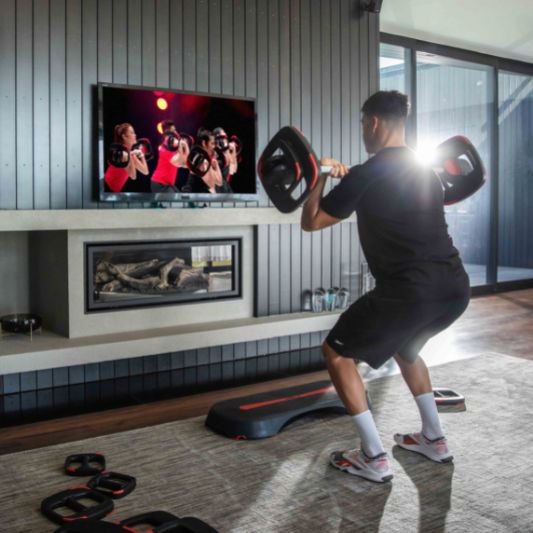What makes a live class in club better than a digital workout elsewhere? Is it the presence of an inspiring Instructor; the sense of community; the pumping music; or the specialist equipment?
Most operators would say it’s all these things combined that make a live class the pinnacle workout experience. And it’s something we’ve known throughout the pandemic, even when the boom in digital fitness caused some in the media to question whether gyms would soon become extinct.
The ‘live revival’ we’ve since witnessed has squashed such talk, with clubs coming back strongly and digital demand softening significantly. But wouldn’t it be nice to put the ‘club versus digital’ debate to bed once and for all?
Well, now we can. According to new research presented at the American College of Sports Medicine (ACSM) Conference in June 2022, taking a live class in club brings better results and more enjoyment than doing the same workout digitally at home.
Believed to be the first of its kind, the pilot study from the Les Mills Research Lab compared a BODYCOMBAT® class in a gym setting with live-stream and Video on Demand (VOD) sessions following the same Release at home. Participants’ average heart rate was 14 per cent higher during the gym class compared to the live-stream and VOD sessions, despite being the exact same class format and Release.
As well as motivating them to work harder, the in-club workout was rated by participants as being 13 per cent more enjoyable and 14 per cent more satisfying than the two digital workouts.
Researchers believe the greater intensity and more positive perceptions of a club-based class can be attributed to what they call ‘Groupness’. The term was coined after previous research from Penn State University found that people in live group exercise classes experience increased levels of individual exertion, enjoyment, and satisfaction as a result of exercising together in a studio, particularly when their movements are synchronised.
GROUPNESS EXPLAINED
Dr Jinger Gottschall, Adjunct Associate Professor at the University of Colorado and Lead Researcher for the study, said: “When considered with previous research, our findings show we really are social when it comes to working out – being together brings out the best in us.
“The combination of exercising as a group, led by an Instructor, in a live studio setting, results in a more impactful and immersive workout than doing the same class at home via live-stream or VOD. Having more fun and feeling connected also increases the likelihood of maintaining an exercise habit over a sustained period of time.”
A viable option
But despite in club workouts yielding better results and enjoyment, the research found that digital solutions still have a role to play in helping to grow the club market and attract new audiences.
“Although live classes are best for maximising both physiological intensity and psychological perceptions, our research shows live-stream and VOD fitness class formats are viable options for maintaining regular physical activity routines,” adds Bryce Hastings, Les Mills Head of Research and co-author of the study.
“In fact, study participants reported feeling less self-conscious and worried about their performance during the VOD workout, highlighting its potential as a gateway into regular exercise for newcomers who may not yet feel confident enough to join a live class in-club.
“A live class at the gym remains the pinnacle experience, but the rise of digital fitness and flexible working reinforces the notion that hybrid fitness habits will become the norm. The 2021 Global Fitness Report found the majority of exercisers now favour a 60:40 split between gym and home workouts, so it will be interesting to see how fitness habits shift as the world learns to live with COVID.”

A new age of fitness
The ultimate winner will be the consumer, who now has more ways to work out and greater flexibility, making it easier to sustain their exercise habit. For clubs, the key challenge will be to leverage these digital tools to maintain member motivation and engagement in a way that complements the in-club experience.
With excellent execution, the retention benefits this brings are two-fold. The extended reach from their digital offerings means clubs can do more to motivate members in between each club visit and maintain their exercise habit, while it also reduces the risk that their heads will be turned by rival offerings online or elsewhere.
Maximising this opportunity requires a total reimagination of the member journey and how we measure engagement. Instead of simply tracking club attendances, we need to pan out and look holistically at all the touchpoints a member has with their facility. This includes home workouts via the club’s digital offering, and even use of the club app to accurately assess member engagement and take actions to enhance this. Customer-centricity and seamless connection between the club and home will prove key to winning in this new age of fitness.
“One of the most important strategies that health, fitness, and wellness clubs need to employ is to expand their reach beyond the traditional bricks and mortar to provide members with a total wellness solution,” says Kevin McHugh, COO of The Atlantic Club in New Jersey, US.
“The leading health and fitness clubs of the future will provide a full omni-channel solution to their members.”
GIVE YOUR MEMBERS WHAT THEY WANT
Omni-channel solutions are the key to success in the new post-pandemic landscape. Click here to discover how the Ultimate Group Fitness Solution can future-proof your club.

